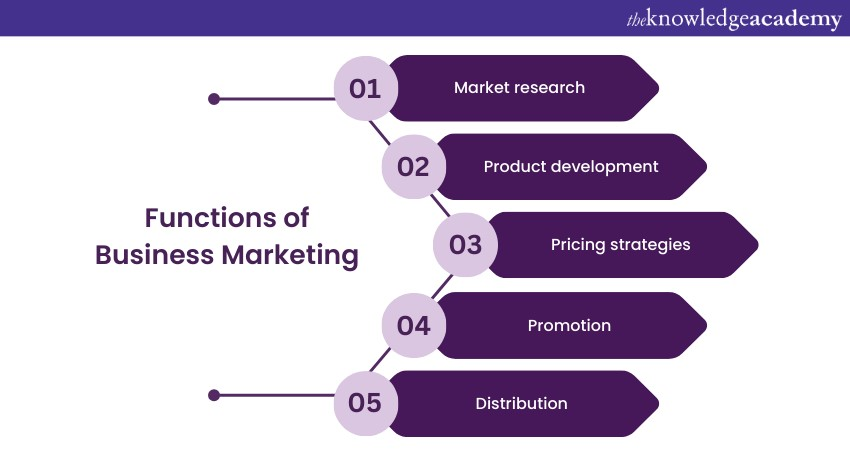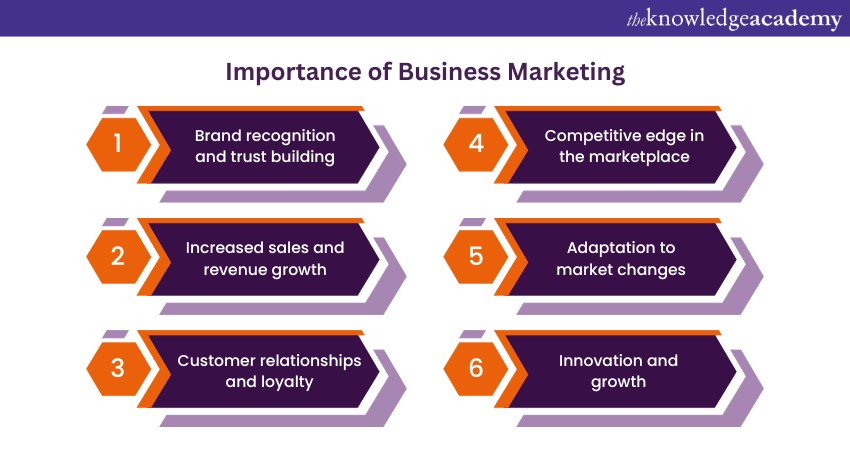We may not have the course you’re looking for. If you enquire or give us a call on +353 12338944 and speak to our training experts, we may still be able to help with your training requirements.
Training Outcomes Within Your Budget!
We ensure quality, budget-alignment, and timely delivery by our expert instructors.

Have you ever wondered how businesses connect and make deals with each other? That's the power of Business Marketing in action! It's more than just selling – it's about forging relationships and promoting products or services specifically between companies. What is Business Marketing all about?
This comprehensive blog will unveil the fascinating world of Business Marketing. We'll explore the core strategies and approaches used to navigate this unique landscape. From building brand awareness to nurturing leads, you'll discover how businesses connect and thrive in the marketing world. By the end, you'll have a clear understanding of what Business Marketing is and how it fuels successful partnerships. Let's unlock the secrets of marketing success!
Table of Contents
1) Understanding what is Business Marketing?
2) What are the Functions of Business Marketing?
3) Types of Business Marketing
4) Importance of Marketing in Business
5) Conclusion
Understanding What is Business Marketing?
Business Marketing is the strategic orchestration of activities by enterprises to promote and sell their products or services. It goes beyond simple transactions, aiming to build enduring connections with other businesses or consumers. Unlike marketing directly to individual consumers, Business Marketing navigates the complex landscape of interactions between entities, creating a narrative that surpasses mere exchange.
Essentially, Business Marketing is the art and science of forming meaningful relationships, understanding market dynamics, and positioning a brand to resonate with its audience. It involves crafting messages, identifying target markets, and developing strategies that foster long-term brand loyalty, transcending immediate transactions.
What are the Functions of Business Marketing?
The functions of Business Marketing encompass a spectrum of activities aimed at promoting, selling, and building relationships within the commercial landscape. These functions contribute to the success and sustainability of businesses. Let's delve into the key functions that define the dynamic nature of Business Marketing:

a) Market research
The journey begins with market research, a foundational activity that systematically explores the industry, target audience, and competitive landscape. This step is crucial for understanding consumer needs, preferences, and market trends, forming the bedrock of effective marketing strategies.
b) Product Development
Armed with market insights, businesses proceed to product development. This involves innovation, adaptation, and creating products or services that align with identified market demands. The goal is to offer solutions that meet customer needs and stand out in the market.
c) Pricing Strategies
Determining the right pricing for products or services is a strategic function in Business Marketing. Businesses must consider production costs, competitor pricing, and perceived value to set prices that are competitive yet profitable, ensuring sustainability and appeal to the target market.
d) Promotion
Promotion is the outward-facing aspect of Business Marketing, involving the creation of compelling messages and using various channels to reach the target audience. Advertising, digital marketing, public relations, and other promotional tools are deployed to generate awareness, interest, and desire for the products or services.
e) Distribution
Ensuring that products or services reach the right place at the right time is a critical function. Distribution channels are carefully selected to optimise accessibility for the target market. This involves strategic planning to make products available where and when customers are most likely to purchase.
Supercharge your business acumen with our Introduction to Marketing Training – empower your journey to marketing mastery today!
Types of Business Marketing
The types of Business Marketing are as varied as the markets they serve, each catering to unique dynamics, audiences, and industries. Let's embark on a detailed exploration of these types, delving into the distinct characteristics and strategies that define them:
Business to Consumer Marketing (B2C)
Business-to-Consumer (B2C) Marketing is the most familiar and widely recognised form of marketing. In this approach, businesses directly engage with individual consumers, focusing on creating emotional connections and understanding consumer behaviours. The aim is to deliver products or services that meet personal needs and preferences.
B2C Marketing often utilises mass communication channels, such as advertising across various media platforms, to reach a broad audience. The ultimate goal is to prompt consumers to make purchasing decisions based on emotions, preferences, and immediate needs.
Business to Business Marketing (B2B)
Business-to-Business (B2B) Marketing revolves around transactions between businesses. Unlike B2C, B2B Marketing targets other businesses as primary customers, emphasising building long-term relationships based on trust and reliability.
B2B transactions typically involve larger order volumes, longer sales cycles, and a focus on delivering value through efficiency, cost-effectiveness, and strategic partnerships.
Communication channels in B2B Marketing are more targeted and personalised, often involving direct sales efforts, industry events, and professional networks.
Industrial Marketing
Industrial Marketing is a specialised type that focuses on businesses selling products to other businesses involved in manufacturing and construction. This includes raw materials, machinery, and other essentials for industrial processes.
Industrial Marketing requires a deep understanding of the industrial sector, including technological trends, supply chain dynamics, and procurement processes. The emphasis is on demonstrating the utility, efficiency, and reliability of industrial products to businesses that depend on them for their operations.
Service Marketing
Service Marketing differs from product-focused marketing by promoting intangible offerings such as healthcare, education, or hospitality. The focus shifts from tangible goods to creating positive customer experiences.
Service Marketing relies heavily on building trust, emphasising service quality, and managing customer perceptions. Strategies often include highlighting expertise, customer testimonials, and the overall experience that the service provider can deliver.
Professional Service Marketing
Professional Service Marketing caters to businesses where the primary offering is the expertise and skills of professionals like lawyers, consultants, and doctors. In this niche, trust and reputation are paramount. Professional Service Marketing focuses on positioning individuals or firms as authorities in their fields.
Strategies typically involve thought leadership, testimonials, and networking to establish credibility and attract clients seeking specialised expertise.
In summary, these types of Business Marketing showcase the diversity of approaches businesses adopt to reach their target audiences, whether they are individual consumers, other businesses, or specific sectors like industrial or professional services.
Elevate your marketing prowess with our Content Marketing Course – unlock the secrets to captivating audiences and boosting your brand's impact today!
Importance of Business Marketing
Business Marketing is a cornerstone in enterprises' success and sustainability, playing a pivotal role in shaping brand perception, driving sales, and fostering long-term relationships with customers. The importance of Business Marketing extends across various dimensions, each contributing to a business's overall growth and resilience.

a) Brand recognition and trust building:
Effective Marketing creates brand awareness, making businesses easily recognisable in the market. Consistent and strategic branding efforts contribute to the establishment of trust and credibility among consumers. A strong brand identity becomes a powerful asset in a competitive marketplace, influencing consumer perceptions and choices.
b) Increased sales and revenue growth:
One of the primary objectives of Marketing is to increase sales. A well-executed Marketing strategy can attract potential customers and convert them into loyal patrons, which becomes the engine for revenue growth. Marketing efforts generate leads and nurture them through the sales funnel, ultimately translating into increased sales figures.
c) Customer relationships and loyalty:
Effective Marketing is crucial in establishing and cultivating robust relationships with customers. Understanding customer needs and preferences enables businesses to tailor their offerings, creating a personalised experience that fosters loyalty. Long-term customer relationships are invaluable, as satisfied and loyal customers often become brand advocates, contributing to organic business growth through positive word-of-mouth.
d) Competitive edge in the marketplace:
In a competitive marketplace, Effective Marketing sets businesses apart. It allows organisations to showcase their unique value propositions and stand out in the minds of consumers. A well-defined and compelling Marketing strategy positions a business as a preferred choice, providing a competitive edge over rivals.
e) Adaptation to market changes:
Markets are dynamic, with consumer preferences, trends, and technologies constantly evolving. Marketing equips businesses with the agility to adapt to these changes. By staying attuned to market dynamics, businesses can adjust their strategies, introduce innovative products or services, and remain responsive to customer demands.
f) Innovation and growth:
Marketing is intertwined with innovation. It encourages businesses to think creatively, explore new ideas, and adapt to emerging technologies. Through market research and customer feedback, companies can identify opportunities for innovation, leading to continuous growth and relevance in the market.
Elevate your marketing prowess with Marketing Courses —ignite your success today!
Conclusion
Understanding What is Business Marketing empowers you to navigate the marketing world. From strategic partnerships to targeted communication, this approach fosters successful collaborations that fuel business growth. Dive deeper into specific strategies to unlock the true potential of Business Marketing!
Transform your business with effective marketing strategies – Sign up for our Strategic Marketing Course now!
Frequently Asked Questions

The 7 Ps of Marketing are Product, Price, Place, Promotion, People, Process, and Physical Evidence. These elements form a comprehensive framework for marketing strategies, ensuring that all aspects of a product or service are effectively addressed.

The 5 M's in Marketing are Manpower, Money, Materials, Machinery, and Methods. These factors represent the essential resources and strategies required for successful marketing campaigns, focusing on the efficient allocation and utilisation of organisational assets.

The Knowledge Academy takes global learning to new heights, offering over 30,000 online courses across 490+ locations in 220 countries. This expansive reach ensures accessibility and convenience for learners worldwide.
Alongside our diverse Online Course Catalogue, encompassing 17 major categories, we go the extra mile by providing a plethora of free educational Online Resources like News updates, Blogs, videos, webinars, and interview questions. Tailoring learning experiences further, professionals can maximise value with customisable Course Bundles of TKA.

The Knowledge Academy’s Knowledge Pass, a prepaid voucher, adds another layer of flexibility, allowing course bookings over a 12-month period. Join us on a journey where education knows no bounds.

The Knowledge Academy offers various Marketing Courses, including Introduction to Marketing Training, Business Marketing Strategies Training and Marketing Research Training. These courses cater to different skill levels, providing comprehensive insights into B2B Conversion Rate Optimisation.
Our Digital Marketing Blogs cover a range of topics related to Business Marketing, offering valuable resources, best practices, and industry insights. Whether you are a beginner or looking to advance your skills as a Digital Marketer, The Knowledge Academy's diverse courses and informative blogs have you covered.
Upcoming Digital Marketing Resources Batches & Dates
Date
 Business Marketing Strategies Training
Business Marketing Strategies Training
Fri 21st Feb 2025
Fri 25th Apr 2025
Fri 20th Jun 2025
Fri 22nd Aug 2025
Fri 17th Oct 2025
Fri 19th Dec 2025







 Top Rated Course
Top Rated Course



 If you wish to make any changes to your course, please
If you wish to make any changes to your course, please


